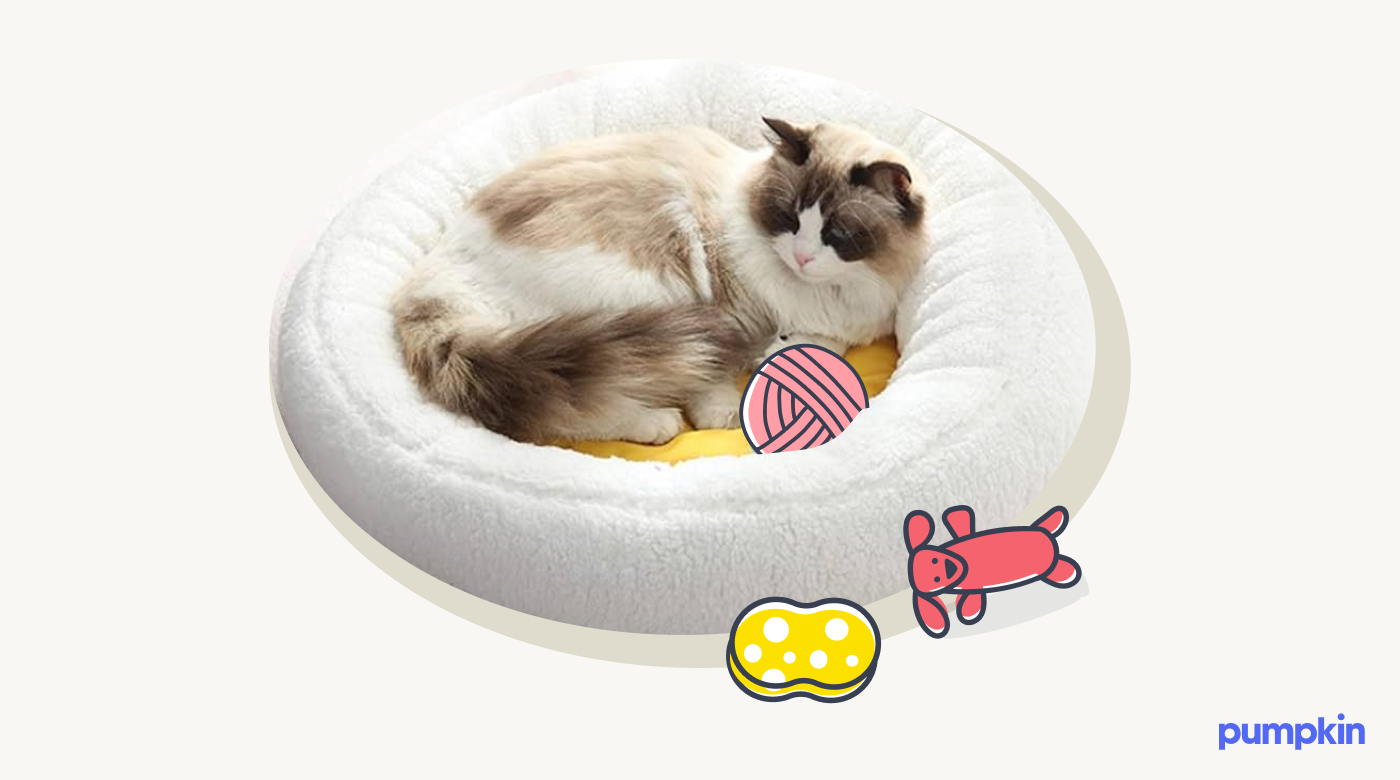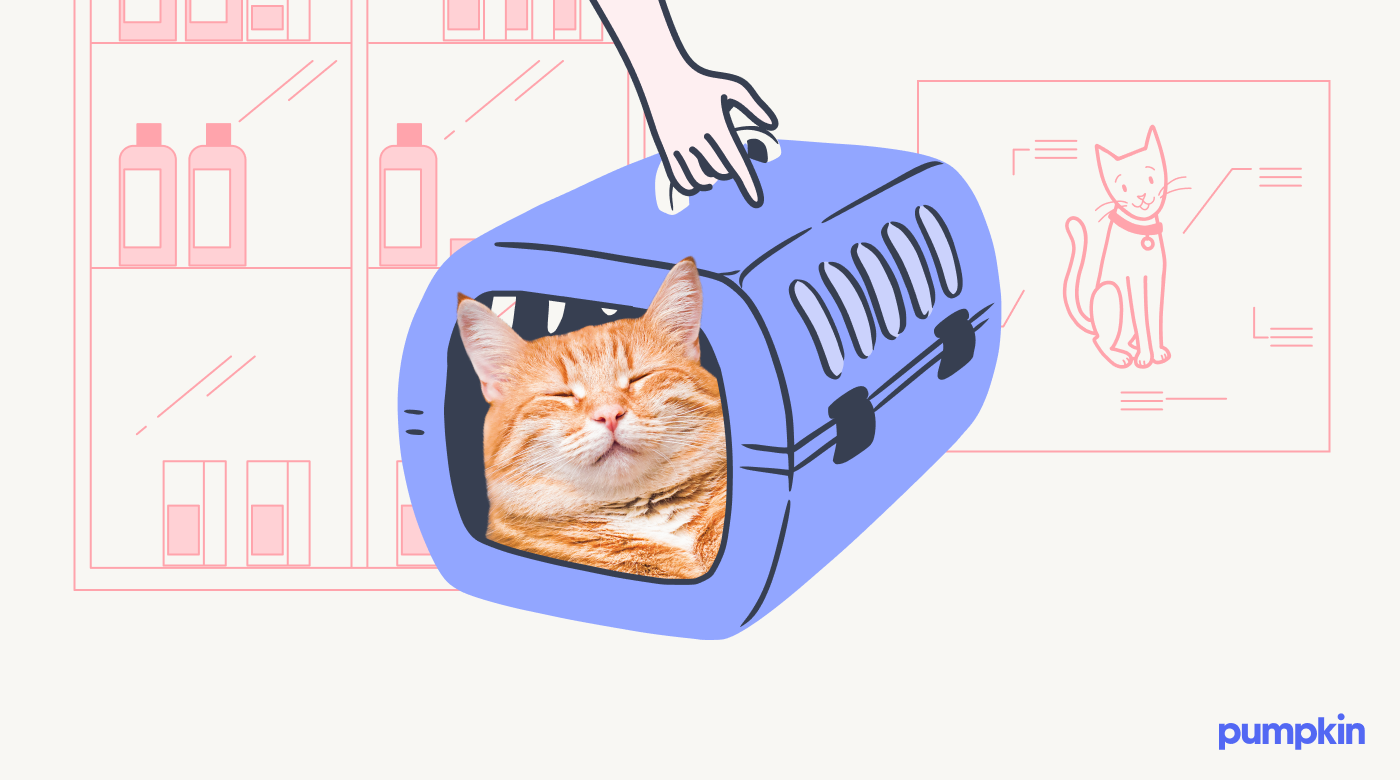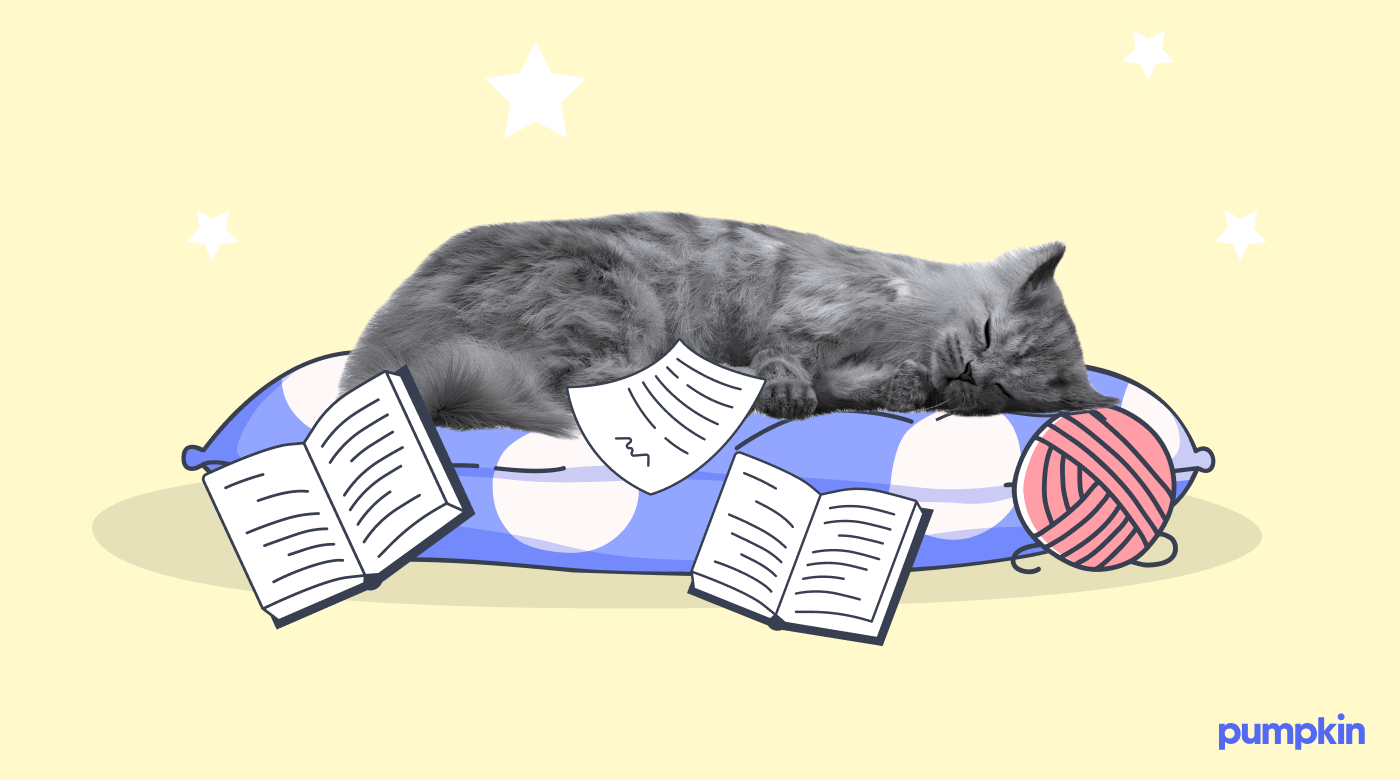- Dec 24, 2024
- 8 min read
Updated: Nov 5, 2025
Key points
Generally, cats sleep between 12 and 18 hours each day.
Cat sleeping patterns can be attributed to factors like age, boredom, injury, or illness.
Other sleep-related behaviors displayed by cats (such as sleeping on their pet parent’s chest or curling up in a ball) can be explained by biological causes and even emotional factors.
If your cat sleeps longer than usual and displays symptoms of injury or illness, consult your vet right away.
If you had to compile a top-five list of things your cat loves to do, that list would probably include eating, playing, and scratching like there’s no tomorrow. None of these activities, though, is a lock for the top spot. That honor goes to sleeping.
Pet parents, of course, get restless now and then at the sight of their snooze machines in action (or, more appropriately, inaction). Watching your cat sleep for hours on end is hardly adrenaline-pumping, except if it makes you worry whether they’re doing alright.
So, what’s the deal here? Should you dial up your vet the next time your cat gets more than forty winks? This article will — once and for all — answer cat parents’ questions about their feline friends’ sleeping habits. (Spoiler alert: Except for extreme cases, there’s not much to worry about!)
So, why does my cat sleep so much?

To answer this question, let’s first look at the numbers. The majority of cats sleep anywhere between 12 and 18 hours daily. That means some sleep less — but some sleep even more!
Going further, you can break down your kitty’s expected sleeping habits by age group:
Kittens, the younglings that they are, tend to sleep through most of the day with breaks for feeding.
Adolescent cats (six months to two years old) tend to have erratic sleep patterns combined with periods of intense playfulness.
Adult cats (those who are between three and six years old) get anywhere between 12 to 20 hours of shut-eye per day. That’s a wide range, but your adult cat has likely found their sweet spot and sticks to a consistent sleep schedule.
Here’s the longest snoozefest of them all: Senior cats (11 years old and above) get even more sleep than their younger counterparts.
In comparison, human children need between 9 and 12 hours of daily sleep, while human adults can typically get by on 7 to 9 hours. So, what is it about cats that require them to spend more time sleeping?
Once upon a time, cats had to do a lot more than meow to get fed. Your pet cat’s ancestors were hunters, meaning they spent plenty of energy in the process of securing their food. Consequently, they had to replenish their internal power storage through several hours of sleep. And, as obligate carnivores, they had no choice: They had to eat meat and would get sick without it. Adequate sleep, then, ensured that historical wild cats stayed in great shape to secure their daily protein needs.
Here’s another detail that heightens our perception of cats’ lengthy sleep time: their crepuscular nature. Crepuscular animals such as cats are most active in the twilight hours — that is, dusk and dawn. This means that, while some cat parents are still soundly sleeping, their feline friend is wide awake and on the prowl somewhere, pouncing on mice or crinkly ball toys.
Then, as these cat parents set off for work in the morning, they see their cat entering a state of slumber — some much-needed deep sleep after an exhausting hunt. (It’s also possible that you wake up in the middle of the night due to your cat’s excessive meowing. To find out what your cat is trying to communicate here, check out our guide on cat meows.)
My cat likes to sleep on my chest. Why?

It’s a sweet gesture and all, but is there a particular reason your cat loves to sleep on your chest? There is. Your cat may very well be trying to convey one or more of these feelings:
A sense of comfort.Plain and simple, your cat sets up camp on your chest because they love you. It’s a sign of affection, which should probably be your cue to pat yourself on the back for being a good cat parent.
Jeremy Williams, editor-in-chief of Pet Educate, takes it a step further: “Cats usually like the smell of their favorite person, as scent is one of the main ways that they identify you.” Taking a nap on your chest puts them in a better position to savor your odor.
A sense of security. On a deeper level, your cat likes to sleep on your chest because they trust you. Take note that cats are naturally wary of strangers; most don’t just snuggle up to the first human that enters the room. If your cat has become rather fond of sleeping on your chest, it’s because they have established that you are a trustworthy individual who won’t bring them harm.
A call for attention.This typically happens when you’ve been away from home for the entire day (or longer). Once they notice you sitting comfortably on the couch, your cat may pounce on the opportunity to initiate a bonding session.
There are cat parents who love bringing their feline friends along on their adventures. If you’d like to be one of these folks who log many miles with their cat, check out our practical guide for traveling with your kitty.
An attempt to give you comfort.Do you think you’re the only one who notices how other creatures feel? Cats are capable of sensing your emotional state. They might then decide that the best way to boost your morale is to sleep on your chest.
While we’re at it, why does my cat sleep in a ball?

Let’s get all those sleep-related questions out of the way, shall we?
At some point, you must have been curious about your cat curling up in a croissant-like ball while snoozing soundly. Though you may have whipped out your phone and snapped a few pictures, you probably couldn’t help but wonder about that sleeping position. Is that even comfortable?
Here’s the thing: Cats aren’t doing this just to be cute. When your cat curls up in a ball while sleeping, the intention is to protect vital organs within their abdomen. In addition, this position helps your cat keep warm. Even during their downtime, your cat instinctively employs defensive tactics.
Occasionally, cats assume this position because of pain or illness, so pet parents should be vigilant. If you see symptoms indicating your cat is enduring some sort of ailment, consult your vet right away.
What about the other sleeping positions that your cat assumes? You can bet that each of these positions means something, too. Dr. Stuart Hovis of PetMD provides the following explanations:
Sleeping on their back:Your cat feels quite secure. They wouldn’t be exposing their belly if they didn’t.
Making like a loaf:If your cat resembles a nice loaf of bread, they are quite comfortable, but they are ready to react to a threat. By assuming this position, your cat can easily wield their claws to ward off an attack.
In a box:Cats like boxes! They can be cozy and warm, with an easy escape route if need be. Their ancestors were predators, sure — but any small creature can be prey, too, so safe hidey-holes were needed.
When should I be concerned about my cat’s sleeping patterns?

There may be cause for concern if your cat goes beyond their typical number of sleeping hours or seems to be sleeping less than usual. If your cat exceeds even the 20 hours of sleep that can be expected from felines, or if their sleep schedule changes drastically, there might be some medical issue that needs to be resolved.
Some factors that can lead to longer sleeping hours for your cat include obesity, feline depression, illness, infection, and poisoning. If you notice an uptick in your cat’s sleeping hours, pay attention to their behavior, appearance, and even the way that they purr.
Consult your vet right away if you notice symptoms that indicate some other cause for your cat’s lengthy sleeping. (Eligible sick visits, by the way, are covered by Pumpkin Cat Insurance plans.)
Don’t sleep on these cat facts

To reiterate, the notion that “cats sleep an excessive amount” is a byproduct of looking at cats’ habits from a human perspective. It’s true that cats typically spend more time sleeping than humans. Their biological profile as obligate carnivores, as well as their evolution as crepuscular hunters, has created a need for 12 to 18 hours of sleep every day. Furthermore, some of their waking hours are bound to happen while their humans are asleep.
If your cat goes beyond their usual number of sleeping hours, though, watch out for other symptoms. The change in your cat’s sleeping habits may be an indication of illness, infection, or injury.
If you notice that your cat likes to sleep on your chest, it’s likely because your cat feels comfortable and safe around you. It could also be your feline’s subtle way of asserting their ‘ownership’ of you, or their way of asking for affection.
FAQs
Why is my cat so lazy?
Cats are natural nappers because their instinct is to conserve energy for hunting. They’re also hardwired to be awake at dawn and dusk and to nap during daylight hours. So, technically, laziness is in their genes. Don’t be too alarmed if your indoor cat sleeps a little more than an outdoor cat though. They are less active, less stimulated, and have a more sedentary lifestyle. If you notice they’re suddenly sleeping more than normal, consider these possibilities:Boredom: Bored cats with nothing to do may sleep moreMedical conditions: Diabetes, kidney disease, or arthritis can lead to excessive sleep in catsAn unbalanced diet: Overfeeding your kitty can make them lethargic and lazySome cat breeds are also naturally more laid-back than others, such as Persians and Ragdolls. But even so, it’s important to offer interactive playtime to keep them healthy and engaged.
Do cats dream?
Scientists shook the Magic 8 Ball (did clinical studies) and all signs point to yes. Scientists have found that REM (rapid eye movement) sleep is an important part of dreaming and takes place in most mammals. Where humans have five stages of sleep, cats only have two (REM and non-REM). Since they spend so much time snoozing, there is a good chance you’ve seen your cat in the middle of a dream. Their dream state may be noticeable by twitches or some kind of body movement. But what are cat dreams made of? No one can be sure — but probably treats, catching prey, and more sleep.
Do cats snore?
Yes, some cats snore. It’s a good sign as it means your cat is very relaxed and comfortable (even if that means you have to be woken up at 3 a.m.) The occasional snoring is usually nothing to worry about, but there could be other more serious reasons for snoring:– Obesity: Excess weight can put pressure on the airways and make snoring more likely.– Respiratory infections: Frequent or loud snoring can mean your cat has a cold, allergies, or other more serious respiratory issues. If you notice your cat snoring loudly all of a sudden, contact your vet for a checkup.
REFERENCES
https://www.cumberlandanimalclinic.com/site/blog/2022/09/15/cat-sleeps-constantly-when-should-worry
https://uk.frontline.com/pet-advice/why-do-cats-sleep-so-much
https://www.iflscience.com/do-cats-sleep-with-their-eyes-open-67637
https://www.mountpleasant.com.sg/education/cat-exercise-mental-stimulation/
https://arborpethospital.com/blog/why-do-cats-sleep-so-much/
https://nexgard.com.au/pet-care/cat-care/why-cat-sleep-so-much
https://www.vets4pets.com/pet-health-advice/cat-advice/kitten/a-guide-to-kitten-sleeping-habits
https://www.sleepfoundation.org/animals-and-sleep/how-much-do-cats-sleep
https://my.clevelandclinic.org/health/body/12148-sleep-basics
https://www.purina.co.uk/articles/cats/behaviour/common-questions/do-cats-dream

